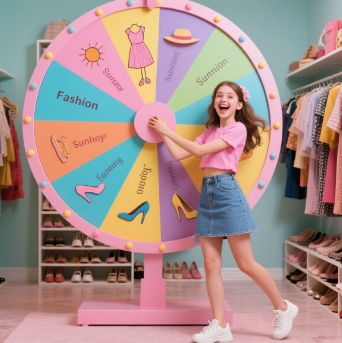Choosing what to wear can be delightful—or daunting. Enter wheel games for fashion choices, a playful and effective solution transforming decision fatigue into engaging fun.
Why fashion decisions deserve a spin 🎡
From “What should I wear?” to “Which look suits today’s mood?”, people constantly wrestle with wardrobe indecision. Research shows that decision fatigue can shrink willpower and stoke stress. Add influence from social media and fast fashion shoppers: 63% of Gen Z consumers crave newness but demand authenticity—even as they shop for outfits onlinelampoonmagazine.com+11spinthewheel.cc+11spinthewheel.app+11. That’s where wheel games come in, offering instant delight, surprise, and a dopamine boost.

Gamification in fashion: data speaks loud
A study in the Journal of Interactive Marketing found that including spin‑to‑win mechanics boosted user engagement by over 42%, and strengthened brand recall and signup ratesspinthewheel.cc+1researchgate.net+1. In fast‑fashion ecosystems, brands like SHEIN leverage similar strategies to drive addiction and purchaseslinkedin.com. Meanwhile, Vogue Business reports that gamified virtual stores—think quizzes, mini‑games and spin wheels—can yield a 10× increase in “add to cart” rates and up to an 88% uplift in salesvoguebusiness.com. These numbers underscore the power of play in fashion tech.
Tailored spin for personalized style
Generic wheels don’t resonate—users expect relevance and autonomy. Academic research warns: one-size-fits-all gamification fails. Personalization is key. For example:
- Gender, geographic location, fashion taste—each influences the appeal of gamified elements.
- Fashion e‑commerce research from 2014 highlights image quality and presentation type (model vs. flat lay) heavily sway user engagement.
A wheel game for style could prompt users to input their colors, occasions, or personality—creating a custom spin that’s meaningful, not random.
Pain points sold with a spin
Leveraging Google-level insights around queries like “what to wear today”, “how to style denim”, and “outfit ideas fast”—users seek quick, helpful suggestions. A fashion-style wheel tackles:
- Morning wardrobe paralysis: quick, playful suggestions to get you dressed swiftly.
- Style exploration: nudging users to try new combinations they wouldn’t ordinarily consider.
- Confidence: users trust suggestions when the experience is interactive and tailored—rather than generic fashion blogs.
Best practices for wheel‑based fashion tools
- Clear benefits: Allow users to define context (casual vs. formal), ensuring results are relevant.
- Progress & feedback: Show badges for trying new styles, track spins made, and reward engagement—mirroring loyalty programs.
- Visual immersion: Include attractive lifestyle images, model-styled looks, or video GIFs to convey tone and mood.
- Social integration: Let users share their spun-out outfits to encourage community engagement and implicit peer recommendation.
- Continuous refresh: Update the wheel monthly with fresh trends, ensuring novelty and anticipation.
The payoff: happier users, measurable results
By integrating wheel games for fashion choices, platforms like spinthewheel boost:
- Engagement: spins create a fun habit loop—users return repeatedly to explore options.
- Conversion: playful discovery leads to higher click-through and purchases; data shows uplifts from 50% to 90% in interactionsplay.google.com+2medium.com+2apps.apple.com+2.
- Retention: personalized experiences translate to long-term loyalty, not just momentary attention.
Conclusion
When users feel empowered, entertained, and seen, they engage more—and that’s exactly what wheel games for fashion choices deliver. By combining data-driven design, personalization, and the thrill of chance, platforms like spinthewheel transform everyday decisions into memorable interactions—making style discovery fun, fast, and future-facing.
About the Wheel-Game Designer (fictional)
Avery Wu is the creative mind behind spinthewheel’s fashion wheel module. A former UX designer and behavioral scientist from San Francisco, Avery holds an M.Sc. in Human‑Computer Interaction. With a passion for wardrobe psychology and gamification, they’ve designed decision‑making games for startups and major shopping platforms alike—earning recognition for blending aesthetics, amusement, and data‑backed user journeys.